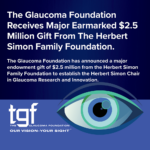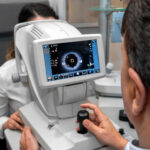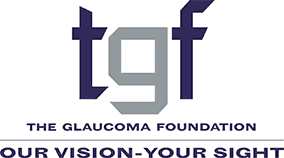Question answered by: Barbara Wirostko, MD, FARVO As we know, IOP fluctuates constantly between doctor visits, throughout the day, night, and throughout the year. The more frequently your IOP is measured, the better the overall picture your doctor will have of your eye pressure variability and maximum IOP. We always look to learn and treat the highest eye pressures. When
TGF News
The Glaucoma Foundation Receives Major Earmarked $2.5 Million Gift From The Herbert Simon Family Foundation

The Glaucoma Foundation has announced a major endowment gift of $2.5 million from the Herbert Simon Family Foundation to establish the Herbert Simon Chair in Glaucoma Research and Innovation. The endowment will support the work of Alon Harris, MS, PhD, FARVO, an internationally renowned leading clinical scientist in the field of ophthalmology and glaucoma. Dr. Harris’s work extends from
How Summer Sun Can Threaten Eyes Already at Risk

It’s not the heat. It’s the glare. The way it bounces off windshields, sidewalks, and open water. Summer doesn’t sneak up on your eyes, it ambushes them. And if you’ve had glaucoma or sit squarely in its crosshairs, the sun doesn’t just blind you; it can speed things up, mess with pressure, and agitate nerves that are already
Healthy Electronics Use for People With Glaucoma: Tips and Tricks

Technology is everywhere—on our desks, in our pockets, and even on our wrists. Whether we’re answering emails, watching videos, reading the news, or video chatting with loved ones, screen time has become unavoidable. According to a 2024 WCNC report, American adults now spend an average of 6 hours and 58 minutes per day using digital devices. That’s
Message From The President

Dear Readers, I’m writing you only a few weeks after the grand occasion of TGF’s 41st anniversary Gala. It was a wonderful evening, when over 200 friends came together to celebrate the Foundation’s remarkable achievements and to honor the recipients of the evening’s prestigious awards. I’m delighted to tell you that $425,000 was raised in support of our ongoing vital work.
Living Well: A Comprehensive Healthy Living Guide for Seniors

Healthy aging is about much more than just avoiding illness—it's about thriving physically, mentally, and emotionally as you enjoy life’s later chapters. By adopting simple, sustainable habits, seniors can boost their energy, protect their independence, and experience more joy day to day. From staying active to nurturing social connections, here are several ways older adults can live well,
How to Take Control of Your Eye Health After a Glaucoma Diagnosis

A glaucoma diagnosis can bring many questions and concerns about your eye health and future. While it may feel overwhelming at first, taking the right steps can help you navigate this new reality with confidence. Learning about your condition, seeking appropriate care, and making informed decisions will be key to managing it effectively. By taking a proactive approach,
TGF Founder Dr. Robert Ritch Steps Down from The Glaucoma Foundation
Dr. Robert Ritch, the founder of The Glaucoma Foundation (TGF) and its Medical Director and Co-Chair of its Scientific Advisory Board, is stepping down from these roles as of March 1st after 40 years of exceptional service. “We are most grateful for Dr. Ritch’s outstanding and singular contributions over the years,” said Dr. Gregory K. Harmon, TGF’s Board Chairman. “As
Creating a Supportive Workplace: Strategies for Including Employees with Disabilities

Creating a workplace that values diversity and inclusivity is not only ethically sound but also strategically beneficial. By focusing on the integration and support of employees with disabilities, organizations can tap into a broader range of talents and perspectives. This approach requires thoughtful implementation of supportive structures and incentives that cater to the unique needs of these employees.
Doctor, I Have a Question. What Are Some Recent Advances in the Treatment of Glaucoma?

Question answered by: While there is still no cure for glaucoma, the past year has seen advances in several aspects of the disease – for example, sustained-release glaucoma medications that can improve compliance and treatment efficiency, devices that help clinicians treat glaucoma, and encouraging research results. It is estimated that almost half of glaucoma patients do not take their eyedrop

